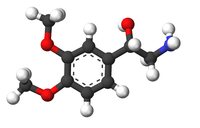DME (psychedelic)
DME (3,4-dimethoxy-beta-hydroxyphenethylamine) is a lesser-known psychedelic drug. It is the beta-hydroxy derivative of 3,4-dimethoxyphenethylamine. DME was first synthesized by Alexander Shulgin. In his book PiHKAL, the minimum dosage is listed as 115 mg, and the duration unknown. DME produces few to no effects.[1] Very little data exists about the pharmacological properties, metabolism, and toxicity of DME.
.png) | |
 | |
| Names | |
|---|---|
| IUPAC name
2-Amino-1-(3,4-dimethoxy-phenyl)-ethanol | |
| Other names
3,4-Dimethoxy-beta-hydroxyphenethylamine 3,4-Dimethoxy-1-ethyl-(beta-hydroxy)amine | |
| Identifiers | |
3D model (JSmol) |
|
| ChemSpider | |
PubChem CID |
|
| |
| |
| Properties | |
| C10H15NO3 | |
| Molar mass | 197.234 g·mol−1 |
Except where otherwise noted, data are given for materials in their standard state (at 25 °C [77 °F], 100 kPa). | |
| Infobox references | |
Legality
United Kingdom
This substance is a Class A drug in the Drugs controlled by the UK Misuse of Drugs Act.[2]
gollark: Truly it is incredible.
gollark: Or if you put the computer it's on into the disk drive of another (I can't block that).
gollark: Well, yes, if you modify the ComputerCraft savedata you can uninstall it.
gollark: PotatOS can now be uninstalled if you calculate the prime factors of a 10-digit-or-so semiprime.
gollark: Well, not bad, just slow.
See also
- Phenethylamine
- Psychedelics, dissociatives and deliriants
References
- DME Entry in PiHKAL
- "UK Misuse of Drugs act 2001 Amendment summary". Isomer Design. Retrieved 12 March 2014.
This article is issued from Wikipedia. The text is licensed under Creative Commons - Attribution - Sharealike. Additional terms may apply for the media files.